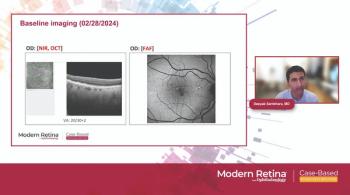
Benefits certain risks less clear in anti-VEGF for ROP
Anti-VEGF therapy has an important role in the current management of retinopathy of prematurity (ROP), but there are many unanswered questions surrounding its use, and particularly regarding its systemic safety, said speakers at the inaugural Retina World Congress.
Presenting the Chilean experience using anti-VEGF therapy to treat ROP, Paola Dorta, MD, said it is now considered as primary treatment, depending on the zone of the disease, and used as an adjunct in treating ROP retinal detachments.
“The use of anti-VEGF drugs for the management of ROP was a logical choice for us for many reasons, and in 2008 we started using bevacizumab (Avastin, Genentech) to treat eyes that had progression of disease despite laser," said Dr. Dorta, Fundación KYDOFT, Santiago, Chile. "Then we used it in babies with posterior zone I disease without macular development and subsequently as first-line therapy for type 1 ROP.”
Dr. Dorta and colleagues published their results using bevacizumab 0.625 mg as primary treatment for zone I ROP in 12 eyes of 7 patients. All eyes in the series showed regression and none needed additional intervention. Retinal vascularization after ROP regression followed a normal pattern, although it occurred relatively slowly. There was no retina destruction and the refractive outcomes were better than after laser photocoagulation, she said.
Discussing anti-VEGF injection as an adjunct to vitreoretinal surgery in treating ROP detachments, Dr. Dorta explained that vascular activity is a major problem when operating on ROP retinal detachments.
“Delaying surgery for the eye to become spontaneously quiet can result in progression of the detachment. Our solution is to use anti-VEGF therapy 1 week preoperatively, and we have seen this leads to a very significant reduction in vascular activity,” she said.
Safety issues
Dr. Dorta also reported that the need for retreatment after anti-VEGF injection for ROP at her center seems to be lower than the rate reported in other series.
“This might be influenced by many factors, including differences in our patient population,” she said. “Because re-treatments could increase the potential for side effects, we recommend that if there is progression of the disease after anti-VEGF injection and the vessels are already in zone II, laser should be applied.”
Addressing safety, Dr. Dorta said that anti-VEGF injection for ROP appears to have good local safety, but its systemic safety in premature babies is not yet established and she raised the possibility that using lower doses or a different agent might provide the desired local benefit with no or less systemic risk.
In a talk focusing on the systemic safety of anti-VEGF therapy for ROP, Robert L. Avery, MD, said that while the BEAT-ROP study showed that bevacizumab can have great benefit in ROP, he questioned whether the investigators underestimated the potential systemic risks accompanying its use.
Dr. Avery noted that the BEAT-ROP investigators suggested that because of its large size, bevacizumab might only escape the eye in very small amounts. He is in private practice, California Retina Consultants.
Refuting that idea, however, Dr. Avery cited a paper showing that following intravitreal injection in infants with ROP, bevacizumab was found to be present in the blood and reached a maximum concentration that was physiologically relevant and 9-fold higher than that observed in adults treated for age-related macular degeneration.
In the infants, bevacizumab was persistently present and reduced systemic VEGF concentrations for more than 60 days. And, in another study, intravitreal injection of bevacizumab in infants with ROP was found to cause changes in the plasma profile of various cytokines implicated in lung disease.
“In BEAT-ROP there were four deaths from lung disease in the bevacizumab arm versus one in the control arm,” Dr. Avery added,
It has also been reported that a single intravitreal injection of bevacizumab for ROP reduced blood flow in the middle cerebral artery, and that is relevant considering retrospective studies suggesting bevacizumab may adversely affect neurodevelopment.
“There is inherent bias in these retrospective studies, and so it is hard to put a lot of weight on their findings," Dr. Avery said. "The studies to date are inconclusive, and the only way to prove whether or not there are systemic safety concerns associated with anti-VEGF treatment will depend on results from prospective clinical trials."
Newsletter
Keep your retina practice on the forefront—subscribe for expert analysis and emerging trends in retinal disease management.







































